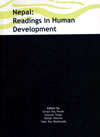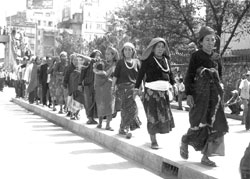|
|
Developing countries offer a perfect laboratory for experimenting with newfangled ideas. Nepal has experienced much more than its fair share of trial and error-induced miseries.
In the late-fifties, some US academics impressed upon King Mahendra that Nepal had the potential to be the Israel of South Asia if it only did away with the strictures of democracy. The king complied and received generous grants to fund trasmigration of hill settlers to the tarai and bhitri madhesh. That test of trickle-down prosperity with the help of foreign aid failed.
Educated at Eton, Harvard, and Tokyo, King Birendra first tried to replace subsistence farming with commercial agriculture. The Japanese did their best to help, but the experiment came unstuck: the poor got poorer, and nobody but the already-rich got richer.
Undaunted, Birendra lowered his sights and set an undefined and unspecified 'Asian Standard' as his next target. When that too came a cropper, 'Minimum Basic Needs' became the mantra for loyal panchas. It didn't save the king and his minions from humiliation in 1990.
Like all other regimes pushed to the forefront by the Third Wave of Democracy, the post-1990 government was served the 'Liberalisation, Privatisation, and Globalisation' agenda of donors as the only way to economic development. The prescription bred corruption and donors immediately suggested 'Good Governance' as the new solution.
Unfortunately, the Maoist insurgency had already begun to spread. So a new expression came into vogue: 'Poverty Alleviation'. Alas, it was too late for buzzwords. Guns had begun to make all the difference in the countryside.
So the new catch phrase became 'Conflict Transformation'. This concept prompted King Gyanendra to stage his phased coup, starting with the 4 October 2002 takeover. Within a year, important donors realised that they needed an exit strategy should the military solution to Maoist insurgency fail. That's when 'Inclusiveness' became the war cry.
Ironically, 'inclusive democracy' is an expression that gained wide currency only when the entire democratic structure of the country was in a shambles.
This was the period when Lynn Bennett was hired by DFID and the World Bank to run an ambitious social science project in Nepal. Her project got a nod from the NPC under the ambitiously named Nepal Gender and Social Exclusion Assessment (GSEA). Unequal Citizens is a summary of that four-year long effort.
Almost all rights activists at the vanguard of championing their causes during the democratic era, but who remained more or less silent after King Gyanendra's 2004 royal-military coup, have contributed to this report. It is elegantly written, competently edited, exquisitely produced, and beautifully printed. But does it say anything new?
Sadly, that's an open question. Perhaps saying something new or substantial was never part of the agenda. The project was probably conceived to keep possible activists occupied while the king handled the Maoists with the help of the military.
That strategy would have worked had the chairman-king been able to deliver. He failed, and Unequal Citizens now must make way for much more fundamental changes in the structure of the Nepali polity.
UNDP's Nepal: Readings in Human Development is somewhat more ambitious. It is in the format of a reader for Masters-level students and seeks to intellectualise the idea of inclusiveness and incorporate diversity into development. A high-voltage team of academic luminaries grace the contents pages. But do any of them say anything that they haven't repeated ad infinitum from public platforms?
Once again, an honest answer will probably offend the touchy technocrats. The problem isn't the academicians, it's the idea of philosophising about a fad that is flawed. Be it democracy or development, there are simply are no quick-fix solutions. Every country has to pass through the learning curve to reach its own level of liberty, order, and prosperity. All suggested short cuts are illusory.
These two publications show that we have a long way to go in producing knowledge. Other than offering some interesting case studies and potentially useful data, these volumes contribute very little to the advancement of social science studies.
CK Lal

Unequal Citizens: Gender, Caste, and Ethnic Exclusion in Nepal (Summary)
A co-publication of The World Bank and DFID, Kathmandu
ISBN 99946-890-0-2,
Pages: 112+xxvi

Nepal: Readings in Human Development (Edited volume)
UNDP, Pulchowk, Kathmandu
ISBN 99933-763-9-6,
Pages: 295



